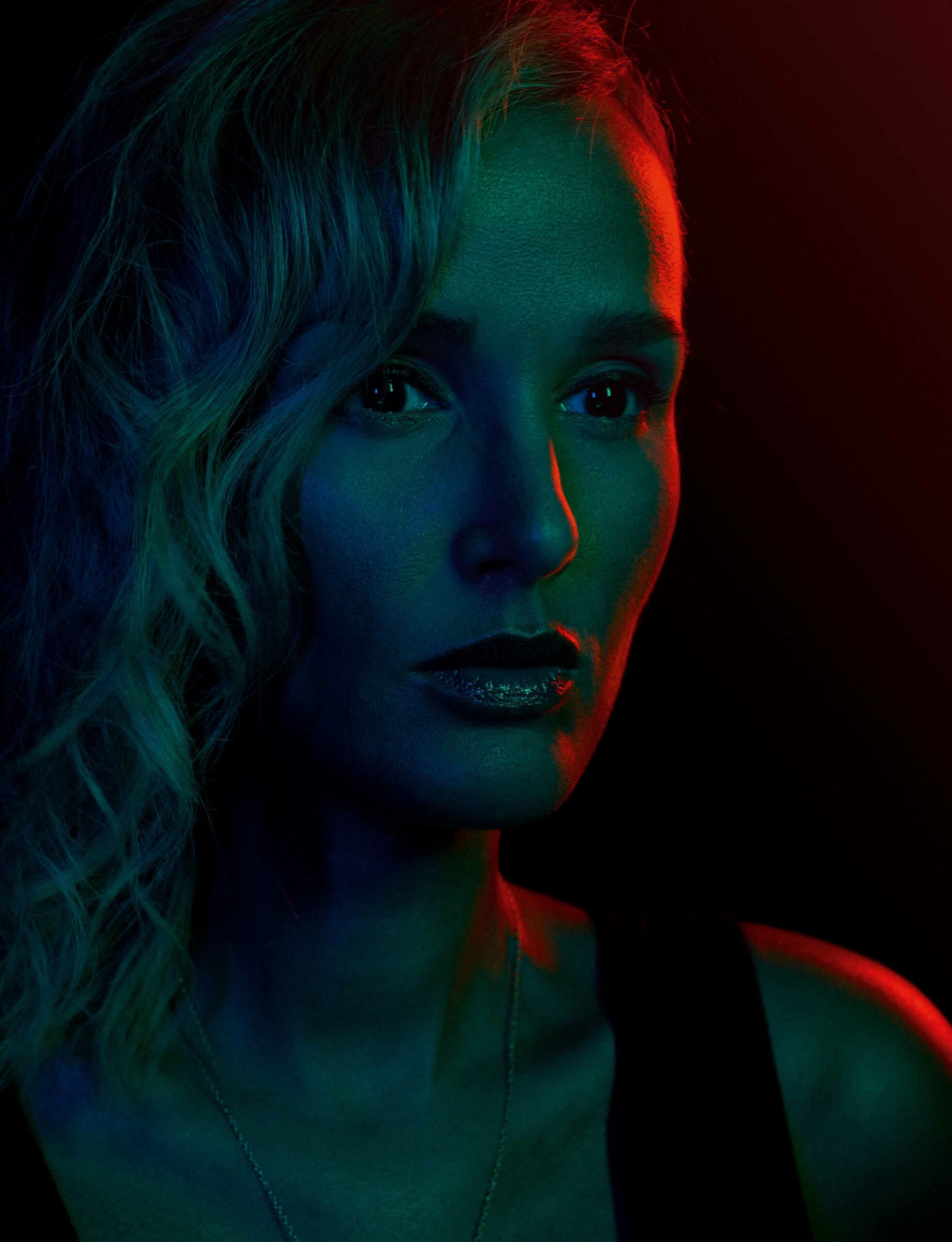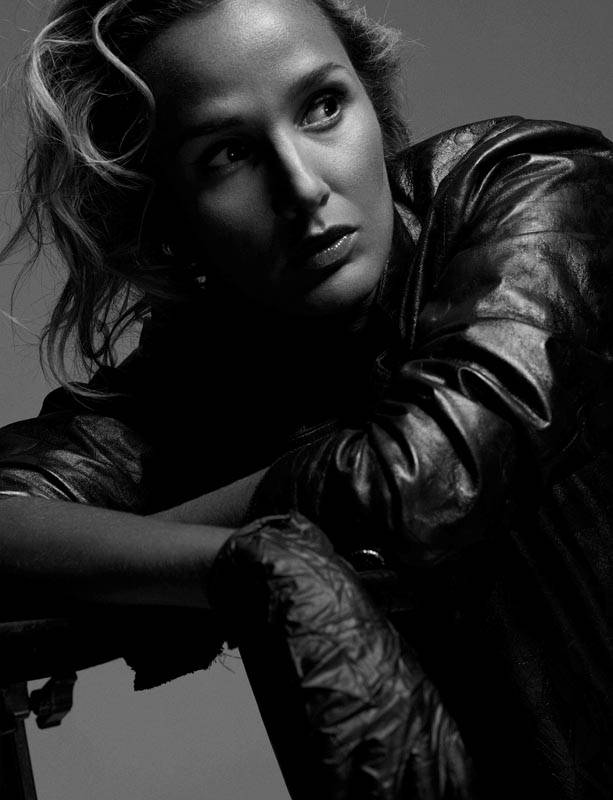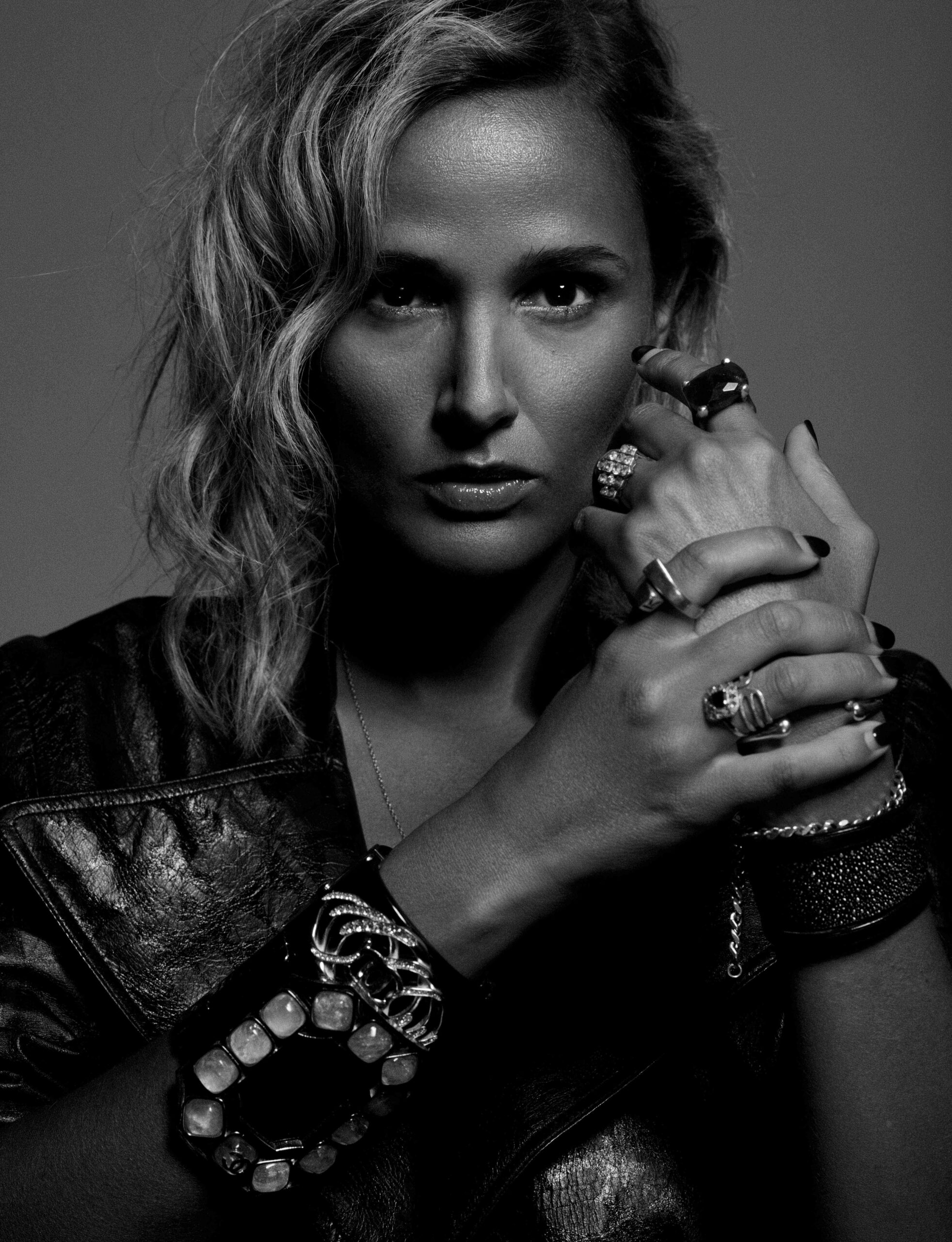
13
Interview with Julia Ducournau, the filmmaker who won the title at Cannes and conquered the United States
Five years after her first feature film Raw, which attracted a lot of attention, Julia Ducournau won the Palme d’Or at the last Cannes Film Festival. At 37 years old, she is the first director since Jane Campion in 1993 to receive the prestigious award. With her masterful second film, Titane, she has now established herself in the eyes of all as a great genre filmmaker, defying all the conservatisms of French cinema.
Published on October 13, 2021. Updated on May 31, 2024.

She often repeats the word “absolute”, as if inhabited by the idea of living intensely. His film Titane was proof of this: shock of the year, it won the Palme d’Or at Cannes by telling the story of a serial killer who crosses paths with a surrogate father. Five years after Raw, her first feature film that already attracted a lot of attention, Julia Ducournau has established herself as a great filmmaker at the age of 37. Just before the world tour she is about to do to accompany the film, the Parisian gave us an interview where she talks about her award and her obsession with a world more open to otherness.
NUMBER: After winning the Palme d’Or at Cannes for Titane, your life changed. How are you today?
JULIA DUCOURNAU: The film is released worldwide between October and December, so I’m very much in demand to talk about it. In England, Germany, the United States… With Grave, my first film, it was already intense. I feel like I’m in a continuous sprint. I still want to defend the film, I will defend it until the end, even if I admit that I am also looking forward to the next one. Since the post-production of Titane, I’ve been thinking about it. I have this furious tendency. I need to create a draught in my head and think about somewhere else to temper the emotions I feel. But to answer your question, it’s okay. I still don’t realize what happened. I’m not sure I’ll ever realize. It all looks like a washing machine. The moment when I became most aware of the magnitude of what was happening was on the night of the awards, on stage.
The sequence was very beautiful. At one point, you used the word “imperfect” about your film. I thought it was very healthy.
Me too! [Rires .]
What exactly did you mean?
You have to understand one thing, it’s that at that moment, on stage, what’s happening to me is so surreal that the first person I think of is Jane Campion… As if by a “transfer” mechanism, I wondered how she herself could have felt when she heard her name pronounced when the Palme d’Or was announced. It also made me think of all the directors who have gone through this moment before me. Obviously, as a filmmaker, I had dreamed a lot about this scene. But I realized that in fact, this prize symbolizes perfection, and in any case, an absolute. But today, I only see the flaws in my film. All my life, I’ll only see the flaws in my films, otherwise I won’t be able to move forward. I am convinced that perfection is only as a quest. At no time in the creative act is it completed.
You added that perfection is a dead end.
It’s an idea I believe in for cinema, and for life in general. What touches me in the world are the most imperfect things. I think we love someone more for their flaws than for their qualities. When you’re in love with a person, you can make a list of their qualities and you won’t love them any less if you take one away. For me, flaws embody much more. It’s like scars: it speaks of the past.
In the construction of Titane, you took a risk by cutting the film into two very different parts, one quite gory and sticky to the main character, the other where Vincent Lindon arrives. Where did this desire for a change come from?
In the first versions of the screenplay – there were about ten in total – the film was chaptered, which implies caesuras. I found myself quite constrained in this pattern, and I realized that this initial choice was based on the fear of not being understood and heard. But I didn’t want that. I don’t want to explain, to psychologize, to take the viewer by the hand. What interests me is to make the scenes dialogue with each other like languages, to create a new language that would be that of the film. From the third version of the script, I abandoned the chaptering. I thought about certain films and certain acts of filmmakers, because those who inspire me are those who show the greatest freedom. I really like those who, for example, succeed in killing off their main character quite quickly, as in Psycho, and keep the audience in the film. I also thought of William Friedkin’s Los Angeles Federal Police . In my film, I see less a break between two parts and two figures than a passing of the baton. This passage underlines the energy of the film. The two characters feed on it like a womb. There’s a lot of talk about fluid circulation in Titane and that’s part of it.
At the official presentation of the film in Cannes, we felt a very powerful energy. These “fluids” you are talking about were crossing the screen in the direction of the room.
The film changes, in the same way that my characters change. Titane begins very baroque, bloated, full of pretenses, to move towards a form of purity, the essence of the relationship between the two main characters, this serial killer and this fireman who wants to be her father. A relationship freed from all representations and all the expectations of the viewer. Hence this impression of permanent tension for the audience, because I only worked on the thread that led me from the baroque at the beginning to the sacred at the end – we end with the music of Bach’s St. Matthew Passion . Both characters leave their lies. How can we bring out a truth that would bring humanity into play, in all its acceptance of the other? Total, unconditional and absolute acceptance of the other, I tried to go there. So, we start in the body, because it’s my way of connecting you with characters who, a priori, are not necessarily morally identifiable or lovable. I hold you through their physical experience which is universal. If you see someone in the cinema getting shot in the arm, you know it hurts and you feel the pain. I summon this experience and, as time goes by, the experience of the body gives way to emotion. In the end, we are only in emotion. It was very difficult to achieve this, a real challenge. I realized that it is very hard to talk about love and that for me, words were not enough. That’s why there is very little dialogue in the film, to express this feeling of absolute choice of the other.

Titane confirms your love affair with genre cinema, especially with Cronenberg and specifically with his film Crash.
For me, there is no direct homage in the film, except to Michelangelo’s Pietà . When you make a second film, it’s hard enough to get out exactly what you have in your head, which rings true with you and with your vision, so as not to try to reproduce it. Also, I totally understand why people think of Crash. I’ve also been told about Christine de Carpenter, but I don’t agree as much, because for me this film wasn’t seminal in the same way as Cronenberg’s work. For the latter, I will speak of “influence”, but not of “reference”. Cronenberg’s work came into my life at a moment that was absolutely constructive and foundational: adolescence. It was one of the first choices I made on my own, outside of my parents’ tastes. It built me up intellectually. I discovered an attraction for his films. And in attraction, there can also be repulsion. We can be attracted to something that puts us off. That’s kind of the feeling I had at the beginning when I saw his films, when I was 14, 15 or 16 years old. It didn’t make me feel comfortable. I came back to try to understand why I saw beauty where everyone said there was ugliness.
Titane kicks in good cinephile taste, with a queer approach. One thinks of the cyborg manifesto by the philosopher Donna Haraway, through the main character whose body is made of metal…
I was told about this book and pointed out that the figure of the cyborg has become a queer figure. Believe it or not, I haven’t read it, but I intend to take it with me on my future travels. Queer and fluidity have built me in life and this applies to gender, sexuality and the world in general. I’m mixed-race, as you can imagine, I’m going through all this. Even if I didn’t know it when I was shooting Titane, I’m happy that the cyborg embodies a queer figure. I realize that ideas are circulating and that’s gratifying. When I arrived in Cannes with Raw in 2016, I thought I would be killed for my evocation of cannibalism. However, several other films talked about it: The Neon Demon by Nicolas Winding Refn and Slack Bay by Bruno Dumont. I was over the moon. I don’t believe in the quest to be original and unique. We are made up of dialogues and more or less direct connections with other artists and art forms. “You always have to be modern”: Rimbaud is right, that’s the only thing that counts.
At what point in your life did you realize that you had a queer vision?
For me, queer is refusing to be determined, refusing the social construction of gender or sexuality. I’m not going to tell you about my life, that’s for sure, but let’s say one thing: when you’re a woman of my generation, you’re brought back to your status as a woman in many places. As a victim, first of all. In everyday life, we know that there is no equality in the apprehension of the public space between men and women. Women are afraid when taking the subway, walking in the street at night. We have reflexes and strategies that men will never have. When you live in it, you tell yourself that something is wrong. In my gender, I don’t feel safe. It makes you want to abolish certain borders and fight, because there is no justification for all this. Women would be weaker, can’t answer? All this was part of the construction of the character of Alexia in Titane. From the moment she is a psychopath, personally I can’t identify with her. So I had to understand his anger. His anger is also my anger. I said to myself: the only thing that connects me to this character at that moment is that it’s a woman. As psychopathic as she is, it is possible that Alexia will be followed, annoyed, assaulted in the public space. The person who is going to do it, like this fan at the very beginning of the film, does not think at any time that he is going to answer. Because you don’t expect a woman to respond, let alone physically. It was a starting point because I don’t believe in violence as an end. I wanted to get Alexia in touch with her humanity, with her emotions.
Have you had this anger in you for a long time?
Ask any woman on that terrace, she has it. Maybe that’s what you don’t realize.
I hear. But I’m trying to understand how it became necessary for you to express it when you became a director. All these angry women don’t make movies.
Ever since I was young, I’ve always needed to express emotions that aren’t necessarily audible. There are a lot of things against the unsaid in what I do. Art is pure catharsis. I studied screenwriting at FEMIS, at a time when I didn’t know what it was to be a director. Originally, I wanted to be a novelist. Since I was little, I’ve been writing. But at FEMIS, in the first year, anyone can make short films. It starts with DIY stuff, small shoots. That’s when I understood that the film is not only written through the script. The camera angles, the lighting, the direction of the actors, the sound: I continued to write a story and make choices. It has never left me.

In what lineage of filmmakers, men or women, do you situate yourself?
I’m not a big fan of the idea of a group, as you may have noticed in my films. [Rires .] On the other hand, it happened several times that I found myself in front of filmmakers who taught me that you could be free, really. That’s all I’m interested in: going to find freedom, to impose it. In addition to Cronenberg, Pasolini was decisive for me from my teenage years. I told myself that he had made his films for all of us. Otherwise, we would have missed a step in humanity. It was almost, on his part, a form of sacrifice. He suffered from his work, long before he died. With others, he inspired me with freedom.
Have women filmmakers been equally important to you?
Kathryn Bigelow! I have a limitless admiration for the woman and the filmmaker. The way she manages group scenes, for example, the energy she deploys in Detroit or in Strange Days… She knows how to talk about the blindness that can be experienced in a group when bodies rub shoulders, with the slightly angry energy that it creates to be against each other. With her, it becomes palpable. As a woman, I think she managed to continue without compromise, without letting herself be reduced to her gender. She has always been the equal of her male peers.
You are the first woman filmmaker to win the Palme d’Or alone – Jane Campion herself must have shared it. Is it a burden?
On stage, something happened in me that was more of a tension towards the future. Jane Campion was the first and she didn’t know if there was going to be a second one. In a way, being a second gives me an advantage, which is to lighten my shoulders. Because I’m already thinking about a third, a fourth, a fifth… I feel like I’m part of a movement that’s already moving forward.
You draw energy from it.
Yes, I’m continuing on my path. My projects are the same as before Titane and its Palme d’Or. And as I see the flaws of the film, I can only think about the next one! After Grave, it was more difficult. I had obtained recognition and I wondered if I hadn’t put everything into it. If I still had the energy, the imagination, the love necessary for a second film. Getting rid of that fear to make Titane was very complicated. It’s a year of blank pages and panic. The radicality of the film is due to this year of intense fear that I had. At one point, I said to myself: “Fuck everyone, I’m going to try to make the film I have in me, whether I like it or not.”
Do you think that cinema still has the power to change lives?
I think so. I make some pretty special films and I hope they generate reactions, good or bad. My goal is for the audience to come out of the screening a little different from the person they were before they entered, even if they realize it several days or weeks later. My hope would be that a few people in the world would say to themselves when they see Titane that they are not alone. That’s what keeps me going.
Are you familiar with loneliness?
When I write, yes: 95% suffering, 5% ecstasy! During the shooting, much less, because others share and feel the film. And it’s worth it. I often do Q&A sessions with the audience, and many see Titane as their life trajectory. They take this story in a very personal way. I only have a small downside to that. In cinema, we often talk about the fourth wall, between the audience and the screen. As a filmmaker, I want to tear it down: I’m always looking for writing and directing strategies to create an umbilical cord between the characters and the audience. However, I realize that with social networks, we have a fifth wall, that of the computer, or even a sixth, that of the mobile phone. It becomes difficult to see and receive a film in a direct way. This is a source of concern. When I see a film, I always try not to know anything beforehand and to live in the moment. I believe in the decisive impact of image and sound, otherwise I wouldn’t be making films anymore. So I work on the organic. The body experience is essential for me. Sharing it with others in front of a screen is unstoppable.
Titane (2021) by Julia Ducournau. The film will represent France at the 2022 Oscars.

















